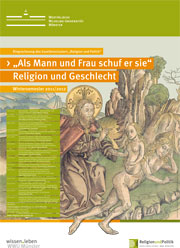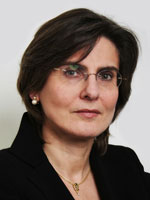“What Religion has to do with Sexuality”
Cluster of Excellence explores the subject of “Religion and Gender” in winter term

Poster of the lecture series
From a historian’s point of view, the three monotheistic world religions traditionally advocate the institutional subordination of women to men. “This is connected with the patriarchal societies from which the religions originated and which are reflected in the Torah, the Bible and the Koran”, said historian Prof. Dr. Barbara Stollberg-Rilinger of the University of Münster’s cluster of excellence “Religion and Politics”. “To this day, women are not allowed to become a priest or an imam, as is generally known. In this respect, the Catholic Church and Islam preserve a pre-modern, patriarchal structure of society.” The historian announced a public lecture series of the cluster on “Religion and Gender”. The first lecture will be held on 18 October.

Prof. Dr. Barbara Stollberg-Rilinger
The series entitled “He created them as male and female” will address current topics such as women in church, celibacy, headscarves, homosexuality in Islam and feminist awakening in Judaism, as the researcher explained. “The keywords themselves show that religions have a lot to do with the relationship of the sexes.” The series explores the subject from Antiquity until today. In addition to the Frankfurt rabbi Elisa Klapheck, women and men of different disciplines will speak: from history, literature, sociology, theology, law and ethnology. The lectures will be held on Tuesdays from 6:15 to 7:45 p.m. in lecture theatre F2, Domplatz 20-22.
According to the historian’s statement, the fact that the Protestant Church and Judaism no longer exclude women from ministries shows “that religious institutions can adapt to the historical change in the order of the sexes. Holy writs are open to interpretation.” The scholar refused to characterise today’s Islam as “misogynistic” across-the-board. Many Muslims were no more patriarchally minded than many a conservative Christian. In the West, such commonplaces obviously served to assure oneself of one’s own progressiveness and moral supremacy. “The question, however, is whether this is not also used to distract from the continuing injustice between the sexes in this country.”
Prof. Stollberg-Rilinger answered the question whether man and woman are not equal before God in most religions: “Maybe in the afterlife, but not on earth.” Probably all religions gave statements on man and woman, for example in the form of norms determining the way in which they are allowed to live together, the extent to which sexuality is permitted, and what a man has to do as a man and a woman as a woman: “Even more elementary are the myths, religious tales of origin containing encoded ideas about the relationship between man and woman. You need only think of the creation of Eve from Adam’s rib and of Eve seducing Adam.”
By means of religious myths, doctrines and ritual practices, the gender norms of the people seem “to be the will of God and natural”, as the scholar said. “That makes the persistence of the order of the sexes so powerful.” On the other hand, according to the historian, beliefs and values can contribute to challenging a dominant order of the sexes “for example by invoking the spiritual equality before God or individual prophetic inspiration”.
It is a central concern of today’s fundamentalists, however, to return to traditional gender roles, said Prof. Stollberg-Rilinger. For them, equal rights of women represented “everything that is unsettling to them in modern times”. Such pious chosen ones in Christianity, Judaism and Islam thus often define themselves via particularly strict gender norms. “They base their group’s identity on the specific sexual purity and chastity of, above all, women in order to distinguish themselves from the sinful environment. Religious purity is equated with sexual purity, the belief of the others with sexual licentiousness.”
The Catholic Church, too, upholds obsolete sexual norms, said the scholar, but thus got on the defensive. “Think of the vow of chastity for clergymen, the prohibition of contraception or the condemnation of homosexuality.” On the social level, the Church is not in a position to enforce these demands and it has probably never been. “Still, the norms are being maintained. How substantive the corresponding theological arguments are, is a matter for theologians to assess. What is defended as a religious demand here without a doubt also serves to consolidate the balance of power.” (vvm)
Programme
| 18.10.2011 | Jochen Martin, Freiburg | Männerwelten – Frauenwelten – Zwischenwelten in der römischen Republik |
| 25.10.2011 | Khola Maryam Hübsch, Frankfurt am Main | Zwischen Gewaltopfer und Haremsphantasie: Zum Selbst- und Fremdbild der muslimischen Frau |
| 08.11.2011 | Eva Schlotheuber, Düsseldorf | Neue Grenzen und neue Möglichkeiten – Religiöse Lebensentwürfe geistlicher Frauen in der Umbruchszeit des 12. und 13. Jahrhunderts |
| 15.11.2011 | Thomas Bauer, Münster | Männerliebe in vormodernen und modernen islamischen Kulturen |
| 22.11.2011 | Sita Steckel, Münster | Perversion als Argument. Wissensordnungen und Geschlechterordnung in religiösen Kontroversen des Hoch- und Spätmittelalters |
| 29.11.2011 | Werner Freitag, Münster | Trösterin der Betrübten, Jungfrau, Mutter und Möhne. Pastorale Konzepte und weibliche Frömmigkeit im Bistum Münster um 1900 |
| 06.12.2011 | Elisa Klapheck, Frankfurt am Main | Frauen im Rabbinat – Feministische Aufbrüche im Judentum von der ersten Rabbinerin Regina Jonas bis heute |
| 13.12.2011 | Titia Loenen, Utrecht | Women, law and religion: dealing with (potential) conflicts between freedom of religion and gender equality from a human rights perspective |
| 20.12.2011 | Bruce Dorsey, Swarthmore | Religion, Gender and the Politics of Conspiracy in Nineteenth-Century America |
| 10.01.2012 | Jürgen Martschukat, Erfurt | „Every thing that can be shaken will be shaken”. Die „Oneida Community” und die Familien- und Geschlechterordnung in den USA des 19. Jahrhunderts |
| 17.01.2012 | Christina von Braun, Berlin | Die Funktion von Geschlecht in den fundamentalistischen Bewegungen |
| 24.01.2012 | Marianne Heimbach-Steins, Münster | „...nicht mehr Mann und Frau“ (Gal 3,28). Geschlecht und Geschlechterverhältnisse – Provokation für Kirche und Theologie |
| 31.01.2012 | Manuel Borutta, Bochum | Kulturkampf als Geschlechterkampf? Grenzen der Säkularisierung im 19. Jahrhundert |
| 07.02.2012 | Bijan Fateh-Moghadam, Münster | Religiöse Neutralität und Geschlechterordnung – Europäische „Burka-Verbote“ zwischen Gender Mainstreaming und Rechtspaternalismus |
Winter semester 2011/2012
Tuesday 18.15-19.45
Lecture hall F2, Fürstenberghaus
Domplatz 20-22
48143 Münster

